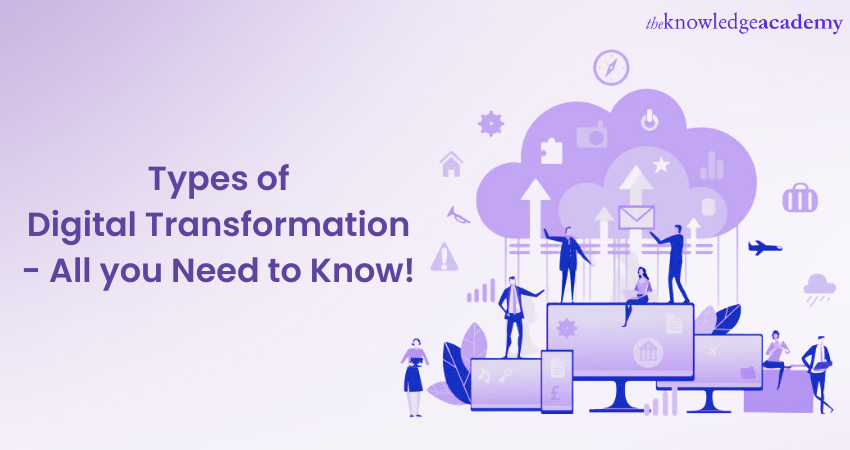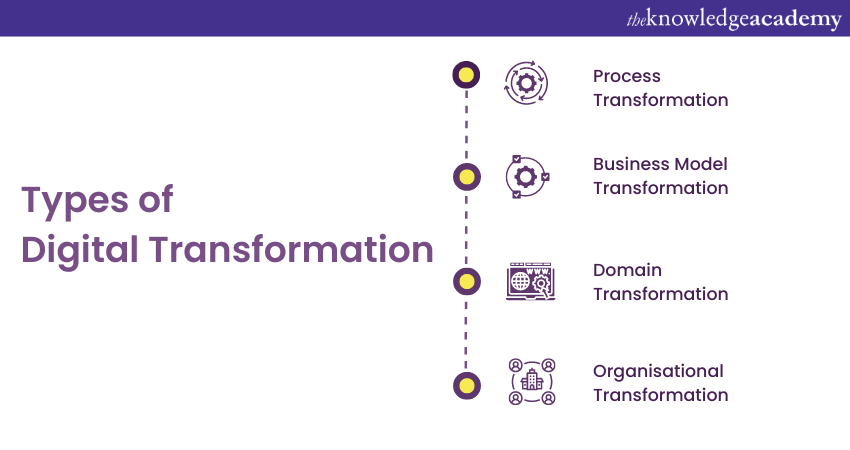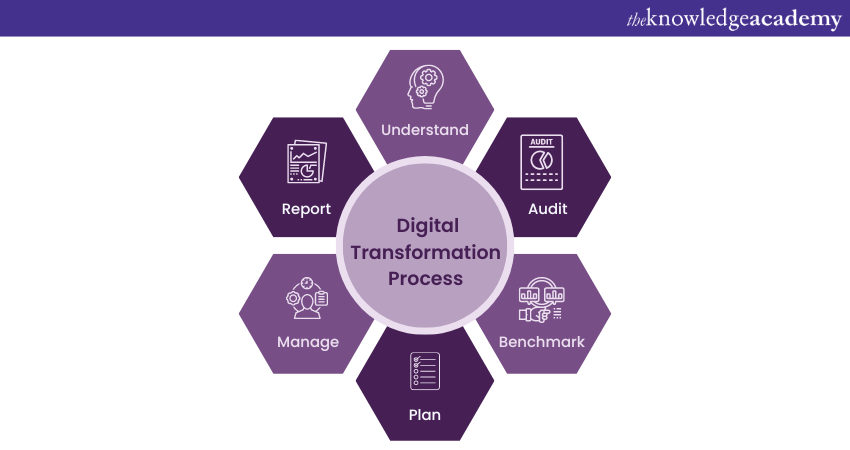We may not have the course you’re looking for. If you enquire or give us a call on 800600725 and speak to our training experts, we may still be able to help with your training requirements.
Training Outcomes Within Your Budget!
We ensure quality, budget-alignment, and timely delivery by our expert instructors.

As the world is embracing digitalisation, businesses must adapt to keep up. This is where various Types of Digital Transformation come into play. Digital Transformation is leveraging digital technologies to fundamentally change how an organisation operates and delivers value to customers.
Statista projects that by 2026, the total cost of Digital Transformation will approach 2.8 trillion GBP, highlighting the widespread adoption of digital transformation among businesses. Continue reading to explore the different Types of Digital Transformation that can provide you with a competitive edge in the digital era. You will also learn why these transformations are essential for corporate success.
Table of Contents
1) The benefits of Digital Transformation
2) What are the four Types of Digital Transformation
3) What are Digital Transformation drivers and technologies?
4) Which type of Digital Transformation will work best for you?
5) Conclusion
The benefits of Digital Transformation
Companies undergoing the Digital Transformation enjoy numerous advantages. The integration of advanced technology enables them to enhance internal processes, reduce labour costs, and boost overall productivity.
The utilisation of software, applications, automation, digital tools, and data collection helps optimise workforce efficiency, facilitates effective Project Management, and enables meeting tighter deadlines. Consequently, businesses can deliver superior products and services.
More importantly, one of the significant benefits of digitalisation is the improvement of the customer experience. The COVID-19 pandemic compelled many businesses to digitise their services and communication methods with customers. Despite the unfavourable circumstances prompting their digital transformation, many businesses' strides in this direction are expected to be notable achievements in the long term.
In today's world, where time is a prized commodity, businesses offering easily accessible products and swift services gain preference. Companies that adapt their business models to provide online services and engage with customers digitally tend to be favoured over those sticking to traditional, in-person-only approaches. This shift provides customers with more options, resulting in increased satisfaction.
Furthermore, digitisation enables companies to collect valuable data through online interactions with customers. This data, when analysed, informs future marketing and sales strategies. Monitoring performance and making strategic decisions based on data insights become possible, contributing to ongoing improvement. Additionally, embracing digital transformation fosters innovation, giving companies a competitive edge over rivals.
What are the four Types of Digital Transformation
Various Types of Digital Transformation can help businesses overcome the Digital Transformation challenges they face in adopting digital technologies. Let's discuss in detail the four most common types of it:

Business Process Transformation
Business Process Transformation is a practice that involves using digital technologies to streamline and optimise various business processes, including supply chain management, customer service, and HR operations. By automating manual tasks, organisations can improve efficiency, reduce costs, and enhance customer experience.
The practice of Business Process Transformation also involves reimagining and redesigning existing processes to improve organisational efficiency, agility, and effectiveness. This includes analysing current processes, identifying areas for improvement, and implementing changes that optimise operations, enhance customer experience, and drive business growth.
The benefits of Business Process Transformation can include the following:
a) Increased efficiency: Streamlining business processes can help reduce waste and inefficiencies, enabling organisations to operate more effectively and efficiently.
b) Improved customer satisfaction: By reimagining business processes to prioritise customer needs and preferences, organisations can improve customer experience. This will lead to higher satisfaction and loyalty.
c) Enhanced agility: Business Process Transformation can make organisations more adaptable and responsive to changing market conditions. This enables them to stay competitive and capitalize on new opportunities.
d) Reduced costs: By optimising business processes, organisations can reduce costs associated with inefficient operations, redundant activities, and unnecessary overhead. This can lead to significant cost savings and increased profitability.
e) Better decision-making: Business Process Transformation can lead to better decision-making by providing organisations with more accurate and timely data. This enables them to make more informed decisions and improve overall performance. By bringing efficiency in operations, Business Process Transformation can help organisations save time and resources, allowing them to focus on core business objectives.
Business Model Transformation
Business Model Transformation is changing how a company creates, delivers, and captures value. It involves revising the company's core business strategies and operations to adapt to changing market conditions and new technologies.
The benefits of Business Model Transformation include increased efficiency, improved profitability, better customer experiences, and a competitive advantage in the marketplace. Here are some uses and benefits of this transformation process:
a) Adapt to changing market conditions: The business environment is constantly changing, and a company must be able to adapt to these changes to remain competitive. Business Model Transformation enables companies to adjust their strategies and operations to meet new market demands.
b) Increased efficiency: Business Model Transformation can streamline processes and remove inefficiencies in a company's operations. This can lead to cost savings and increased productivity.
c) Improved profitability: By optimising their business models, companies can increase profitability through cost savings, revenue growth, and market share.
d) Enhanced customer experiences: A transformed business model can improve customer experiences by providing better products and services, more personalised interactions, and faster response times.
e) Gain a competitive advantage: Companies that successfully transform their business models can gain a competitive advantage in the marketplace. This can be achieved by offering unique value propositions and innovative solutions.
Domain Transformation
Domain Transformation occurs when a company moves or expands its business into a different domain. It is one of the most successful types of digital transformation as it helps companies overcome constraints and take advantage of opportunities to shift from one business to another. Utilising cutting-edge technologies such as artificial intelligence, new mobile and wearable gadgets, and the Internet of Things fuels domain transformation.
Domain Transformation is a type of digital transformation that companies use to modify their business and enter new industries, expanding their audience base. For example, Amazon shifted from being just an e-commerce platform to an online video streaming platform (Prime Video) and also provides cloud services to several organisations in the form of Amazon Web Services (AW2S).
Cultural/Organisational Transformation
Cultural Transformation involves changing an organisation's culture and structure to embrace digital technologies better. This might include implementing agile methodologies, encouraging experimentation, and fostering a more collaborative and innovative culture.
Cultural Transformation changes an organisation's employees' values, beliefs, attitudes, and behaviours. It involves shifting the company culture towards more collaborative, innovative, customer-centric, and adaptive.
The benefits of cultural transformation include the following:
a) Aligning with business strategy: Cultural Transformation can help align employees' values and behaviours with the company's mission and business goals, leading to increased focus and better outcomes.
b) Improving employee engagement: By creating a positive work culture, Cultural Transformation can improve employee engagement, satisfaction, and retention.
c) Enhancing customer experience: Cultural Transformation can improve how employees interact with customers, leading to more personalised and positive experiences.
d) Driving innovation: A transformed culture encouraging creativity and risk-taking can drive innovation, leading to new products and services and increased market share.
e) Increasing agility: A transformed culture can make a company more agile and responsive to changing market conditions, allowing it to adapt quickly to new challenges and opportunities.
f) Strengthening brand reputation: A positive culture can enhance a company's reputation, making it more attractive to customers, partners, and investors.
What are Digital Transformation drivers and Technologies?
The drivers and technologies that facilitate the digitalisation of organisations are described as follows:
a) Cloud computing: This technology facilitates rapid and cost-effective access to computing resources, advanced software, updates, and functionalities for organisations. Instead of enduring weeks or months for on-premises resource setup, the cloud allows them to access resources over the Internet from any global location.
b) Commoditised IT: The commodification of IT allows organisations to redirect investments and human resources from infrastructure to innovation, adding value to customers and distinguishing the organisation in the market.
c) Mobile platforms: Mobile platforms enable work from any location at any time, providing swift access to corporate resources.
d) Machine Learning (ML) and Artificial Intelligence (AI): ML and AI technologies offer intelligent insights, empowering organisations to make more accurate and faster decisions influencing strategic areas like marketing, sales, and product development.
e) Automation: Automation technology lets organisations delegate repetitive tasks to machines, freeing human resources to enhance productivity and efficiency.
f) Augmented Reality (AR) And Virtual Reality (VR): AR and VR offer engaging, gamified access to services remotely.
g) Internet of Things (IoT): Devices hosted on the IoT networks supply data to inform AI services, facilitating automation and personalisation.
h) Edge computing: Edge computing processes data at the device level, maintaining privacy and accessibility while enabling low-latency data processing.
i) Blockchain technology: Blockchain technology is transforming the technology landscape by decentralising various industries. Its fundamental use case involves ledger-based payment processing that anonymises transactions.
Which type of Digital Transformation will work best for you?
No one 'best' type of digital transformation fits all organisations. The type of digital transformation most suitable for an organisation depends on its unique requirements, goals, resources, and capabilities.
For example, one organisation might prioritise improving its customer experience by implementing a user-friendly website, mobile app, or chatbot. At the same time, another might focus on automating its business processes to increase operational efficiency and reduce costs.
In general, however, a successful digital transformation strategy should align with the organisation's overall business strategy and be driven by a clear understanding of its customers' needs and expectations. It should also involve the right mix of technologies, people, and processes to ensure a seamless transition and create long-term value.
Ultimately, the best type of digital transformation enables an organisation to leverage technology to achieve its business goals, stay competitive in the market, and meet customers' evolving needs.

Conclusion
We hope this blog gives a clear understanding of the Digital Transformation types and how they can benefit you in achieving your long-term goals. This blog will help you understand the need for various Types of Transformation with the help of technology to gain profits for your organisation and deliver customer benefits.
You can learn the most recent skills necessary to rule the Digital Transformation domains by enrolling in our Digital Transformation Certification course!
Frequently Asked Questions

Digital Transformation encompasses five key areas, namely Data Analytics,Cloud Computing, Artificial Intelligence (AI),Internet of Things (IoT), andCybersecurity. These areas collectively help organisations implement and employ technologies across their businesses for adopting change.

The top trends that Digital Transformation is comprised of, are privacy and trust, enterprise resource planning, personalisation, data-centric businesses, multi-cloud utilisation, partner ecosystems, IoT and 5G and more.

The Knowledge Academy offers a Digital Transformation Course, called the Digital Transformation Certification. This course caters to different skill levels, providing comprehensive insights into the various ISO 9001.
Our Business Improvement Blogs cover a range of topics related to Digital Transformation, offering valuable resources, best practices, and industry insights. Whether you are a beginner or looking to advance your Business Improvement skills, The Knowledge Academy's diverse courses and informative blogs have you covered.

Knowledge Academy takes global learning to new heights, offering over 30,000 online courses across 490+ locations in 220 countries. This expansive reach ensures accessibility and convenience for learners worldwide.
Alongside our diverse Online Course Catalogue, encompassing 17 major categories, we go the extra mile by providing a plethora of free educational Online Resources like News updates, Blogs, videos, webinars, and interview questions. Tailoring learning experiences further, professionals can maximise value with customisable Course Bundles of TKA.

The Knowledge Academy’s Knowledge Pass, a prepaid voucher, adds another layer of flexibility, allowing course bookings over a 12-month period. Join us on a journey where education knows no bounds.
Upcoming Advanced Technology Resources Batches & Dates
Date
 Digital Transformation Certification
Digital Transformation Certification
Wed 5th Feb 2025
Thu 27th Mar 2025
Wed 14th May 2025
Wed 3rd Sep 2025
Wed 3rd Dec 2025







 Top Rated Course
Top Rated Course



 If you wish to make any changes to your course, please
If you wish to make any changes to your course, please


